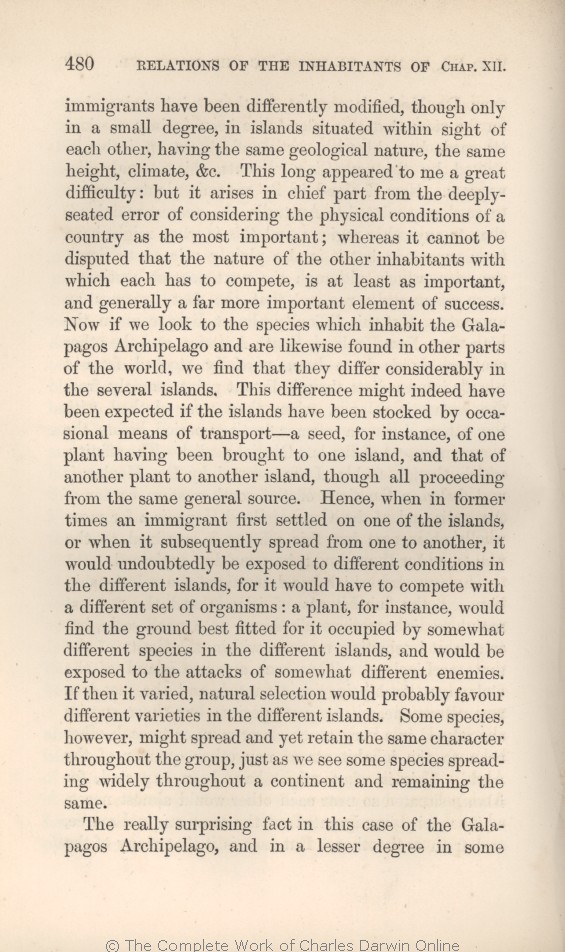the
immigrants have been differently modified, though only in a small degree, in | immigrants have been differently modified, though only in a small degree, in 1869 1872 |
| islands may be used as an argument against my views; for it may be asked, how has it happened in the several 1859 1860 1861 |
| islands may be used as an argument against my views; for it may be asked how has it happened in the several 1866 |
| &C. 1869 | | &c., 1859 1860 1861 1866 | | &c.? 1872 |
| ..... 1869 1872 | | that 1859 1860 1861 1866 |
| ..... 1869 1872 | | many 1859 1860 1861 1866 |
| ..... 1869 1872 | | of 1859 1860 1861 1866 |
| ..... 1869 1872 | | the 1859 1860 1861 1866 |
| ..... 1869 1872 | | immigrants 1859 1860 1861 1866 |
| ..... 1869 1872 | | should 1859 1860 1861 1866 |
| ..... 1869 1872 | | have 1859 1860 1861 1866 |
| ..... 1869 1872 | | been 1859 1860 1861 1866 |
| ..... 1869 1872 | | differently 1859 1860 1861 1866 |
| ..... 1869 1872 | | modified, 1859 1860 1861 1866 |
| ..... 1869 1872 | | though 1859 1860 1861 1866 |
| ..... 1869 1872 | | only 1859 1860 1861 1866 |
| ..... 1869 1872 | | in 1859 1860 1861 1866 |
| ..... 1869 1872 | | a 1859 1860 1861 1866 |
| ..... 1869 1872 | | small 1859 1860 1861 1866 |
| ..... 1869 1872 | | degree. 1859 1860 | | degree? 1861 1866 |
| important; 1869 1872 | | important 1859 1860 1861 1866 |
| OMIT 1869 1872 |
| for its inhabitants; 1859 1860 1861 1866 |
| cannot 1869 1872 | | cannot, 1859 1860 1861 1866 |
| ..... 1869 1872 | | I think, 1859 1860 1861 1866 |
| inhabitants 1861 1866 1869 | | inhabitants, 1859 1860 | | species 1872 |
| at 1859 1861 1866 1869 1872 | | as 1860 |
| the species which inhabit 1869 1872 |
| those inhabitants of 1859 1860 1861 1866 |
| and 1869 1872 | | which 1859 1860 1861 1866 |
| likewise found 1869 1872 | | found 1859 1860 1861 1866 |
| world, 1869 1872 | | world 1859 1860 1861 1866 |
| OMIT 1869 1872 |
| (laying on one side for the moment the endemic species, which cannot be here fairly included, as we are considering how they have come to be modified since their arrival), 1859 1860 1861 1866 |
| that they differ considerably 1869 1872 |
| a considerable amount of difference 1859 1860 1861 1866 |
| if 1869 1872 | | on 1859 1860 1861 1866 |
| islands have 1869 1872 |
| view of the islands having 1859 1860 1861 1866 |
| plant 1859 1860 1866 1869 1872 | | plant, 1861 |
| island, though all proceeding from the same general source. 1869 1872 |
| island. 1859 1860 1861 1866 |
| Hence, 1866 1869 1872 | | Hence 1859 1860 1861 |
| first settled on one 1869 1872 |
| settled on any one or more 1859 1860 1861 1866 |
| ..... 1869 1872 | | island 1859 1860 1861 1866 |
| ..... 1869 1872 | | of life 1859 1860 1861 1866 |
| a different 1869 1872 | | different 1859 1860 1861 1866 |
| set 1869 1872 | | sets 1859 1860 1861 1866 |
| organisms: 1859 1860 1861 1866 1869 | | organisms; 1872 |
| plant, 1859 1866 1869 | | plant 1860 1861 1872 |
| ..... 1869 1872 | | best-fitted 1859 1860 1861 1866 |
| best fitted for it 1869 1872 |
| more perfectly 1859 1860 1861 1866 |
| somewhat different species in the different islands, and 1869 1872 |
| distinct plants in one island than in another, and it 1859 1860 1861 1866 |
| ..... 1869 1872 | | on continents 1859 1860 1861 1866 |
| throughout a continent and 1869 1872 |
| and 1859 1860 1861 1866 |
|









